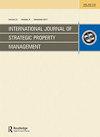Strategic Decision-Making Approaches and Organizational Performance Case of Rugarama Estate Park, Rwanda
IF 2
4区 管理学
Q3 MANAGEMENT
International Journal of Strategic Property Management
Pub Date : 2023-04-17
DOI:10.53819/81018102t2127
引用次数: 0
Abstract
Abstract Decision making is a critical role that managers of organizations play and gives a bearing on the long-term survival of the organization. The study aimed to assess the influence of strategic decision making on organizational performance, taking the case of Rugarama Estate Park. Descriptive design was utilized with a population of 153 constituting of staff of Rugarama Estate Park as per the Human Resource records. A sample of 111 was utilized and purposive and simple random sampling approaches adopted in selecting the respondents to participate in study. The data was primary in nature collected using questionnaires. The study adopted theory of planned behavior. IBM SPSS Version 21 was used in analyzing data. The findings involved computing means, percentages, and frequencies, standard deviation and these were presented in tables. Descriptive statistics did reveal a mean of averagely 2 and less than 1 standard deviation in the case of advocacy decision making approach. However, dialogic and decision systems revealed an average mean of 4. Additionally, the corresponding coefficients for advocacy, dialogic and decision support systems were 0.260, 0.670 and 0.710 respectively. The regression coefficients for advocacy, dialogic and decision support systems were 0.092, 0.142 and 0.174 respectively with corresponding p values of 0.048, 0.002 and 0.001. This implied that advocacy decision making is not widely practiced while dialogic and decision support systems are widely practiced at Rugarama Estate Park. Study also concluded there was low positive significant association between advocacy approach and organization performance while dialogic and decision-making support systems had high positive association with organization performance. The null hypotheses were rejected hence a conclusion there was positive significant influence of advocacy, dialogic and decision support systems on organization performance. The study recommended independent and group thinking to be practiced in organization in decision making process, proposals regarding decision changes should be made available to members and every member given time to go through, all Stakeholders to be involved in decision making process to be able to feel part and parcel of the organization activities and lastly organizations to invest in technology systems that aids in speedy and efficient decision making process.. Keywords: Strategic Decision Making, Organizational Performance, Rugarama Estate Park, Rwanda战略决策方法与组织绩效——以卢旺达鲁加拉马地产公园为例
摘要决策是组织管理者发挥的关键作用,关系到组织的长期生存。本研究旨在评估战略决策对组织绩效的影响,以Rugarama Estate Park为例。根据人力资源记录,采用描述性设计,由Rugarama Estate Park的153名工作人员组成。本研究采用有目的、简单随机抽样的方法,选取111人参与研究。这些数据是通过问卷调查收集的。这项研究采用了计划行为理论。使用IBM SPSS Version 21进行数据分析。调查结果包括计算平均值、百分比、频率和标准差,这些都列在表格中。描述性统计确实显示,在倡导决策方法的情况下,平均值为2,标准差小于1。然而,对话和决策系统显示平均为4。此外,倡导系统、对话系统和决策支持系统的相应系数分别为0.260、0.670和0.710。倡导系统、对话系统和决策支持系统的回归系数分别为0.092、0.142和0.174,p值分别为0.048、0.002和0.001。这意味着倡导决策并没有得到广泛的实践,而对话和决策支持系统在Rugarama Estate Park得到了广泛的实践。研究还发现,倡导方式与组织绩效之间存在低正相关,而对话和决策支持系统与组织绩效之间存在高正相关。零假设被拒绝,因此得出结论,倡导,对话和决策支持系统对组织绩效有显著的积极影响。该研究建议在组织决策过程中实践独立和群体思维,有关决策变更的建议应提供给成员,并给予每个成员时间进行审查,所有利益相关者都应参与决策过程,以便能够感受到组织活动的一部分,最后组织应投资于有助于快速有效决策过程的技术系统。关键词:战略决策,组织绩效,Rugarama Estate Park,卢旺达
本文章由计算机程序翻译,如有差异,请以英文原文为准。
求助全文
约1分钟内获得全文
求助全文
来源期刊
CiteScore
4.00
自引率
18.50%
发文量
23
审稿时长
15 weeks
期刊介绍:
International Journal of Strategic Property Management is a peer-reviewed, interdisciplinary journal which publishes original research papers. The journal provides a forum for discussion and debate relating to all areas of strategic property management. Topics include, but are not limited to, the following: asset management, facilities management, property policy, budgeting and financial controls, enhancing residential property value, marketing and leasing, risk management, real estate valuation and investment, innovations in residential management, housing finance, sustainability and housing development, applications, etc.

 求助内容:
求助内容: 应助结果提醒方式:
应助结果提醒方式:


